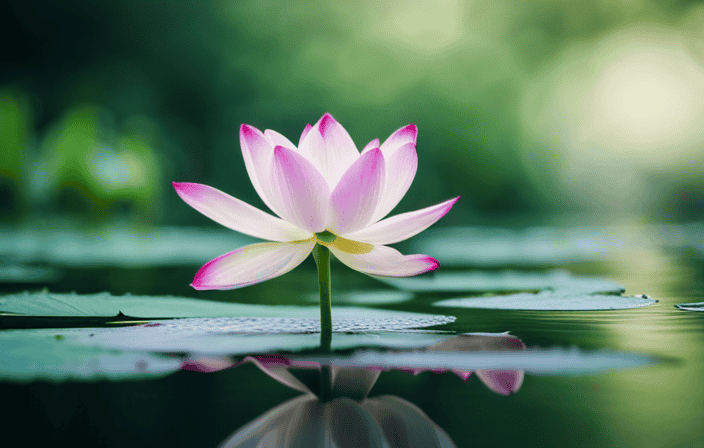Mastering Meditation: Turning Everyday Habits into Eternal Joy delves into the concept of incorporating meditation into our daily habits, transforming it into a lasting way of life. The piece highlights the multitude of benefits that come with regular meditation, such as stress reduction, enhanced focus, and better overall well-being.
By establishing a consistent meditation practice, individuals can overcome challenges, adapt to changing circumstances, and ultimately find joy in the process.
With a calm and insightful approach, this article aims to guide readers on their journey towards mastering meditation and experiencing lifelong bliss.
Key Takeaways
- Start with short meditation sessions and gradually increase the length
- Find a convenient time and comfortable position for meditation
- Use meditation music or podcasts for relaxation
- Stay committed, identify and address challenges, and explore different techniques to enhance the meditation experience
Mastering Meditation: Turning a Daily Routine into Lifelong Bliss
Mastering meditation involves transforming a daily routine into a lifelong source of bliss, allowing individuals to fully experience the benefits of daily practice and integrate mindfulness into their everyday lives.
Meditation techniques for stress relief play a crucial role in this process. By focusing on the breath, practicing body scan meditation, or engaging in loving-kindness meditation, individuals can cultivate a sense of calm and reduce stress and anxiety.
Additionally, incorporating meditation into a busy schedule requires intentional planning and commitment. One can start by allocating small pockets of time throughout the day, such as during breaks or before bedtime. It is also helpful to create a dedicated meditation space and utilize meditation apps or timers to stay on track.
By prioritizing meditation and adapting it to one’s schedule, individuals can unlock the transformative power of this practice and experience lifelong bliss.
Benefits of Daily Meditation
Enhancing one’s well-being and mental clarity, daily meditation fosters a state of tranquility and interconnectedness. Regular practice provides numerous benefits for improving mental health and increasing self-awareness.
By relieving stress and anxiety, meditation allows individuals to cultivate a sense of calm and inner peace. Moreover, it enhances focus and cognitive function, leading to improved productivity and clarity of thought.
Daily meditation also promotes mindfulness, allowing individuals to fully engage with the present moment and derive greater enjoyment from life. Additionally, meditation has been shown to boost metabolism and heart rate, maintain optimal blood pressure, and contribute to overall physical well-being.
With its myriad benefits, daily meditation serves as a valuable tool for enhancing one’s overall quality of life and achieving a sense of lifelong bliss.
Establishing a Daily Meditation Habit
Developing a consistent daily meditation practice requires starting with short sessions and gradually increasing the duration, choosing a convenient time and comfortable position, and incorporating meditation music or podcasts for relaxation.
To build a meditation routine, it is important to establish a daily habit that can be sustained in the long run. Here are two key aspects to consider:
-
Building a strong foundation:
- Begin with short sessions of 5-10 minutes and gradually increase the duration as you become more comfortable.
- Choose a time that works best for you, whether it’s in the morning, during a lunch break, or before bed.
- Find a comfortable position that allows you to relax and focus without discomfort.
- Enhance your meditation experience by using meditation music or podcasts to create a soothing atmosphere.
-
Exploring different techniques:
- Experiment with various meditation styles to find one that resonates with you.
- Incorporate mindfulness into daily activities, such as walking or eating.
- Adapt meditation techniques to suit your individual preferences and needs.
- Seek guidance from experienced practitioners or teachers to deepen your practice.
- Stay open-minded and embrace the journey of discovering what works best for you.
By developing meditation techniques and building a consistent routine, you can cultivate a lifelong meditation practice that brings peace, clarity, and bliss to your daily life.
Overcoming Challenges in Meditation
Overcoming challenges in meditation requires perseverance and adaptability, much like navigating a winding river. One of the common challenges is the ability to maintain focus and overcome distractions.
In today’s fast-paced world, it can be difficult to quiet the mind and let go of external thoughts. However, with practice and patience, it is possible to train the mind to stay present and focused.
Techniques such as adjusting sitting positions, using meditation podcasts or guided meditation, and exploring different meditation styles can help in overcoming distractions.
Additionally, incorporating deep breathing exercises during moments of stress and practicing mindfulness during daily activities can further enhance concentration and overcome challenges in meditation.
By consistently practicing these strategies, individuals can cultivate a deeper sense of calm and clarity in their meditation practice.
Importance of Consistency in Meditation
Consistency in meditation practice is crucial for attaining long-term benefits and integrating mindfulness into daily life. Regular practice enhances the benefits of meditation, allowing individuals to experience improved focus, reduced stress, and increased mental clarity. Consistency builds discipline and habit, making meditation an integral part of one’s daily routine. It reinforces the relaxation response, helping individuals better manage stress and anxiety throughout the day. By practicing meditation daily, individuals can cultivate mindfulness and bring a sense of calm and peace into their lives.
To further emphasize the importance of consistency in meditation, the following table highlights the long-term benefits of a regular meditation practice:
| Long-term Benefits of Consistent Meditation |
|---|
| Enhanced focus and concentration |
| Reduced stress and anxiety |
| Increased mental clarity and creativity |
| Improved overall well-being and happiness |
By committing to a consistent meditation practice, individuals can unlock the transformative power of meditation and experience lifelong bliss.
Finding Personalized Meditation Practices
Consistency in meditation practice is vital for reaping its benefits. Each person has unique preferences and experiences, making it essential to explore and find the right meditation style. With a plethora of options available, individuals can experiment with different techniques, such as mindfulness, loving-kindness, or transcendental meditation, to discover what works best for them. Guided meditation apps or videos can also provide valuable guidance in finding the right fit.
Moreover, incorporating meditation into daily routines and adapting techniques to individual preferences can enhance the practice’s effectiveness. Seeking guidance from experienced practitioners or teachers can provide further insight and support in refining one’s meditation journey.
By finding personalized meditation practices, individuals can create a meaningful and fulfilling meditation routine that suits their unique needs and leads to lifelong bliss.
Creating a Supportive Meditation Environment
Creating a supportive meditation environment involves selecting a quiet and peaceful space, eliminating distractions, and utilizing calming elements like aromatherapy or candles to enhance relaxation.
Finding a dedicated space for meditation is crucial to create a peaceful atmosphere. This space should be free from noise and interruptions, allowing for a focused and undisturbed practice.
Eliminating distractions such as electronic devices or clutter can help create a serene environment conducive to meditation.
Additionally, incorporating aromatherapy or candles can further enhance relaxation by stimulating the olfactory senses and promoting a sense of calm. Utilizing essential oils with calming properties, such as lavender or chamomile, can create a soothing atmosphere during meditation.
By creating a supportive meditation environment, individuals can optimize their practice and experience deeper levels of relaxation and mindfulness.
Benefits of Morning Meditation
Morning meditation offers numerous benefits, including improved focus and productivity, enhanced mental clarity and creativity, reduced stress and anxiety throughout the day, and improved overall mood and well-being. Incorporating morning meditation techniques into daily routine can have a profound impact on one’s productivity and ability to stay focused.
Here are three sub-lists highlighting the benefits of morning meditation:
-
Increased Focus and Productivity:
- Morning meditation helps to clear the mind, allowing for better concentration and focus on tasks throughout the day.
- It enhances cognitive function and mental agility, leading to improved problem-solving skills and decision-making abilities.
- By starting the day with a calm and centered mind, individuals are more likely to prioritize tasks effectively and stay organized.
-
Enhanced Mental Clarity and Creativity:
- Morning meditation promotes mental clarity, allowing for greater clarity of thought and improved creative thinking.
- It enhances the ability to generate new ideas, find innovative solutions, and think outside the box.
- Regular meditation practice in the morning can lead to increased self-awareness and a deeper connection with one’s intuition.
-
Reduced Stress and Anxiety Throughout the Day:
- Morning meditation helps to reduce stress and anxiety levels, setting a positive tone for the day ahead.
- It activates the relaxation response in the body, leading to a greater sense of calm and peace.
- By starting the day with a peaceful mind, individuals are better equipped to handle stressors and challenges that may arise later in the day.
Incorporating morning meditation into daily routine can significantly improve focus, productivity, mental clarity, and overall well-being. By dedicating a few minutes each morning to meditation, individuals can experience a profound shift in their mindset and approach to daily tasks.
Benefits of Evening Meditation
Evening meditation offers various benefits, including promoting restful sleep and relaxation, releasing tension and preparing for restorative rest, and cultivating a sense of gratitude and peace before sleep.
According to a study published in the Journal of Clinical Psychology, regular evening meditation can significantly improve sleep quality and reduce symptoms of insomnia by promoting relaxation and reducing anxiety levels.
Incorporating meditation into one’s bedtime routine can help create a calming atmosphere and signal the body and mind to unwind.
Some evening meditation techniques that can be practiced include deep breathing exercises, body scans, visualization, and mindfulness meditation.
By setting aside a few minutes each evening for meditation, individuals can experience the benefits of improved sleep, reduced stress, and a greater sense of peace before bedtime.
Incorporating Meditation into Daily Activities
Incorporating meditation into daily activities can be a beneficial practice for cultivating mindfulness and reducing stress throughout the day.
One way to do this is through mindful eating, which involves paying full attention to the experience of eating, such as the taste, texture, and smell of the food. By practicing mindfulness during meals, individuals can enhance their awareness of hunger and fullness cues, make healthier food choices, and develop a more positive relationship with food.
Additionally, taking meditation breaks during work or study can help to alleviate stress and increase focus and productivity. These breaks can be as short as a few minutes and can involve simple techniques such as deep breathing or guided meditation.
By incorporating meditation into daily activities, individuals can create a more mindful and peaceful approach to their daily lives.
Making Meditation a Lifelong Habit
To embark on a transformative journey, individuals can view meditation as a compass guiding them towards a lifetime of inner stillness and self-discovery. Making meditation a priority involves overcoming obstacles that may hinder consistent practice.
To ensure a lifelong habit, consider the following:
-
Set realistic goals: Start with small, achievable targets and gradually increase meditation time as proficiency develops.
-
Overcome obstacles: Identify and address challenges such as restlessness, distractions, or lack of motivation. Implement strategies like adjusting the meditation position or exploring different techniques.
-
Seek support: Engage with meditation communities or groups to find encouragement, guidance, and accountability.
-
Embrace the process: Approach meditation with an open mind, acknowledging that progress may vary. Enjoy the journey, celebrate milestones, and adapt the practice to changing circumstances.
By prioritizing meditation and persevering through obstacles, individuals can cultivate a lifelong habit that brings inner peace, self-awareness, and overall well-being.
Frequently Asked Questions
How long does it take to see the benefits of daily meditation?
The benefits of daily meditation can typically be seen within a few weeks to a few months of consistent practice. The duration may vary depending on individual factors such as meditation technique, frequency, and personal goals.
Can meditation help with managing chronic pain?
Meditation has been shown to help manage chronic pain by promoting relaxation, reducing stress, and increasing mindfulness. It can also be beneficial for anxiety and sleep-related issues. Incorporating meditation into a daily routine may provide relief and improve overall well-being.
Is it necessary to meditate at the same time every day?
While it is not necessary to meditate at the same time every day, having a flexible meditation schedule allows for reaping the benefits of meditation without a strict routine. This flexibility accommodates individual preferences and helps maintain a consistent practice.
How can meditation help improve relationships with others?
Meditation can help improve relationships by improving communication and cultivating empathy. Regular meditation practice enhances self-awareness and emotional regulation, leading to better understanding and empathy towards others. It also promotes a calm and focused mindset, facilitating effective communication and conflict resolution.
Can meditation be practiced while lying down?
Meditation can be practiced while lying down, but sitting meditation is more commonly recommended. Sitting allows for better focus and posture, while lying down may lead to drowsiness. To maintain focus during lying down meditation, strategies such as using props or visualizations can be helpful.









